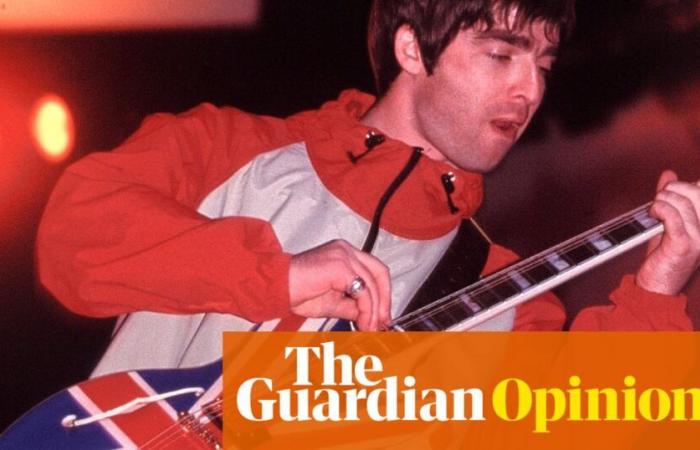
So 15 years of Punch-and-Judy bickering between Liam and Noel Gallagher has ended with the inevitable: Oasis reforming for a UK and Ireland tour – and a giant payday (money talks, especially when Noel has a reported £20m divorce settlement to cover). Cue wild celebrations from the section of the British public who are still nostalgic for the simpler times of Euro 96 and the first Blair administration. Britpop’s coming home.
I’m not among them, and here’s why. I genuinely believe Oasis are the most damaging pop-cultural force in recent British history. It’s easy to attack them for being musically regressive: after all, they didn’t just Stop The Clocks, to quote the title of their 2006 best-of, but rewound them by 30 years. But the real problem is that they set social attitudes back even further.
I’ll never forget being present at the Q Awards in 2000, when Liam Gallagher repeatedly heckled Robbie Williams with “Queer!” and Kylie Minogue with “Lesbian!” as the assembled music business and media tittered nervously, reluctant to kill the goose that laid the golden egg. It’s one of the ugliest scenes I’ve ever witnessed. This wasn’t a one-off either. In 2016, on Twitter, he called Russian football hooligans “batty boys”, and in 2018 used another homophobic slur, “bum chums”, against Noel, Johnny Marr and Paul Weller.
Noel, too, has repeatedly expressed prehistoric views, complaining about a hip-hop artist, Jay-Z, headlining Glastonbury in 2008 (though he’d softened his stance by the time Stormzy headlined in 2019), and describing the then Labour leader, Ed Miliband – yes, Ed Miliband – as a “fucking communist” in 2015 and later Jeremy Corbyn in similar terms.
In 2021, he appeared on the front page of the Sun calling Prince Harry an “effin’ woke snowflake”, and in 2024 complained about Glastonbury becoming too “woke”. (Hint: when anyone uses the word “woke” as an insult, they’re immediately emblazoning another word across their own forehead, which also begins with a “w”.) It’s no coincidence that Oasis are the band of choice for flag-shaggers and Reform voters – it’s remarkable how often their fans have the butcher’s apron on their Twitter bios, just as Noel had it painted on his guitar.
Oasis apologists in the media will always brush over this stuff, calling Noel a “legend” who “gives good copy”, and chuckling at Liam’s “banter”, arguing that Oasis are “the people’s band” or “the voice of a generation”, and that the Gallaghers are expressing the views of the masses in the vernacular of the masses. When you dare to challenge that, you’re invariably accused of “snobbery” against a band who have been dubiously anointed as the sole authentic musical mouthpiece of the proletariat.
But the Gallaghers can’t outflank me on class. At the risk of writing a Glamorgan version of the Four Yorkshiremen sketch, the basic facts of my upbringing are these: single parent family; permanently skint; never had a car; never had a telephone; the TV kept getting repossessed; and I lived in seven different flats and houses before I left home. I’ve seen leafy Burnage and the house Liam and Noel grew up in, and we never lived anywhere as big as that. Nor can they outflank me on age: I’m slightly younger than Noel and guitarist Paul “Bonehead” Arthurs, a bit older than Liam and the others. I’m from their class, and their generation. But the inconvenient truth is that no class is a homogenous mass, and nor is any generation.
Oasis have been presented as the true voice of the council estates from the very start of their career. But what of their less stereotypical, but equally working class, 1990s contemporaries? Don’t they count? No band was more aware of class politics than Sheffield’s Pulp, for example, but Pulp were arty and sang about outsiderdom and dressed like Oxfam dandies instead of Arndale Centre townies, so they’re considered somehow less “real” than their Mancunian peers. Meanwhile, the Manic Street Preachers are as working class as they come, but refused to conform to lads-lads-lads cliches, played with androgyny and homoeroticism, and wore their (state) education on their leopard print sleeves.
The Gallaghers’ knuckle-dragging ideas on sexuality and politics arguably shouldn’t matter. We’re all familiar with the concept of separating the art from the artist, though everyone’s mileage varies on where to set the line in the sand. But the art needs to at least be good. Oasis, memorably described by the late great Neil Kulkarni as the “English Rock Defence League”, offer nothing but a sludgy, trudgy, brontosaurus-bottomed waddle, perfect for that adult nappy gait so beloved of their singer and fans.
Lyrically, too, they’re dismal: the promisingly mischievous Elsa/Alka-Seltzer rhyme of debut single Supersonic soon gave way to dull platitudes that might as well have been written by AI. But the problem is the music. Oasis don’t do fast songs. Noel plays his guitar as if he’s scared it will break, and Oasis’s funkless, sexless plod is always carefully pitched below the velocity at which fluid dynamics dictate that you might spill your lager. Is there anything more useless than a rock band that doesn’t rock?





